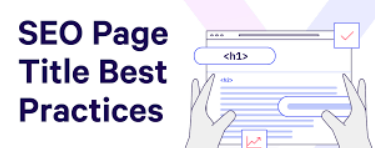A strong online presence is critical in the wide digital realm, where various websites fight for attention.
Search Engine Optimization (SEO) plays a pivotal role in helping your website
rank higher in search engine results and attract organic traffic. While many
factors contribute to effective SEO, one of the most fundamental elements is
your page title. A unique and compelling page title not only improves your
website's visibility but also entices users to click and explore further. In
this blog post, we will delve into the importance of a unique and compelling
page title and provide tips on optimizing it for SEO success.
Why is the page title important?
The page title is the clickable headline that appears in
search engine results and is displayed at the top of a browser's window or tab
when a webpage is opened. It serves as a concise summary of the content on the
page and gives users and search engines an idea of what to expect. Here are a
few reasons why the page title is vital for SEO:
- Search
engine ranking: Search engines consider the page title as one of the most
important factors when determining the relevance and ranking of a webpage.
A well-optimized page title increases the chances of your website
appearing higher in search results.
- User
engagement: A compelling page title captures users' attention and
encourages them to click on your link rather than others. It is your first
opportunity to make a positive impression and entice users to visit your
website.
- Social
sharing: When your content is shared on social media platforms, the page
title is often displayed as the headline. A captivating page title
increases the likelihood of users clicking on the shared link and engaging
with your content.
Tips for creating a unique and compelling page title:
Now that we understand the significance of a page title,
let's explore some tips to ensure it is unique and compelling:
- Be
concise and descriptive: Aim for a title that accurately summarizes the
content of the page while being concise and easy to understand. Keep it
under 70 characters to ensure it doesn't get truncated in search engine
results.
- Incorporate
relevant keywords: Include relevant keywords that align with the content
of your page. Conduct keyword research to identify popular and relevant
terms that your target audience is searching for.
- Avoid
duplicate titles: Each page on your website should have a unique title.
Duplicate titles not only confuse search engines but also make it harder
for users to distinguish between different pages.
- Create
a sense of urgency or curiosity: Use action words or compelling language
to pique users' interest and encourage them to click. Incorporate words
like "ultimate," "essential," "exclusive,"
or phrases like "don't miss out" or "limited time
offer" to create a sense of urgency or curiosity.
- Tailor
titles for social media: When sharing your content on social media
platforms, consider customizing the page title to make it more enticing
for social media users. Experiment with different variations to optimize
engagement.
- Test
and analyze: Continuously monitor the performance of your page titles
using web analytics tools. Analyze click-through rates, bounce rates, and
conversion rates to determine which titles are most effective and refine
your approach accordingly.
Conclusion:
Crafting a unique and compelling page title is an essential
component of effective SEO. It not only improves your website's visibility in
search engine results but also entices users to click and explore further. By
following the tips outlined in this blog post, you can create page titles that
resonate with your target audience, increase user engagement, and ultimately
drive more organic traffic to your website. Remember, the page title is your
opportunity to make a memorable first impression, so make it count!










